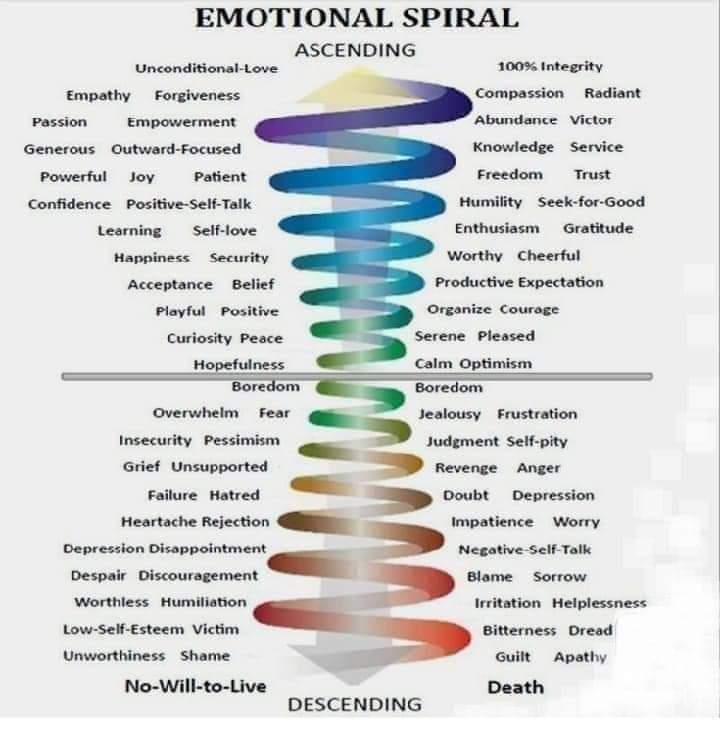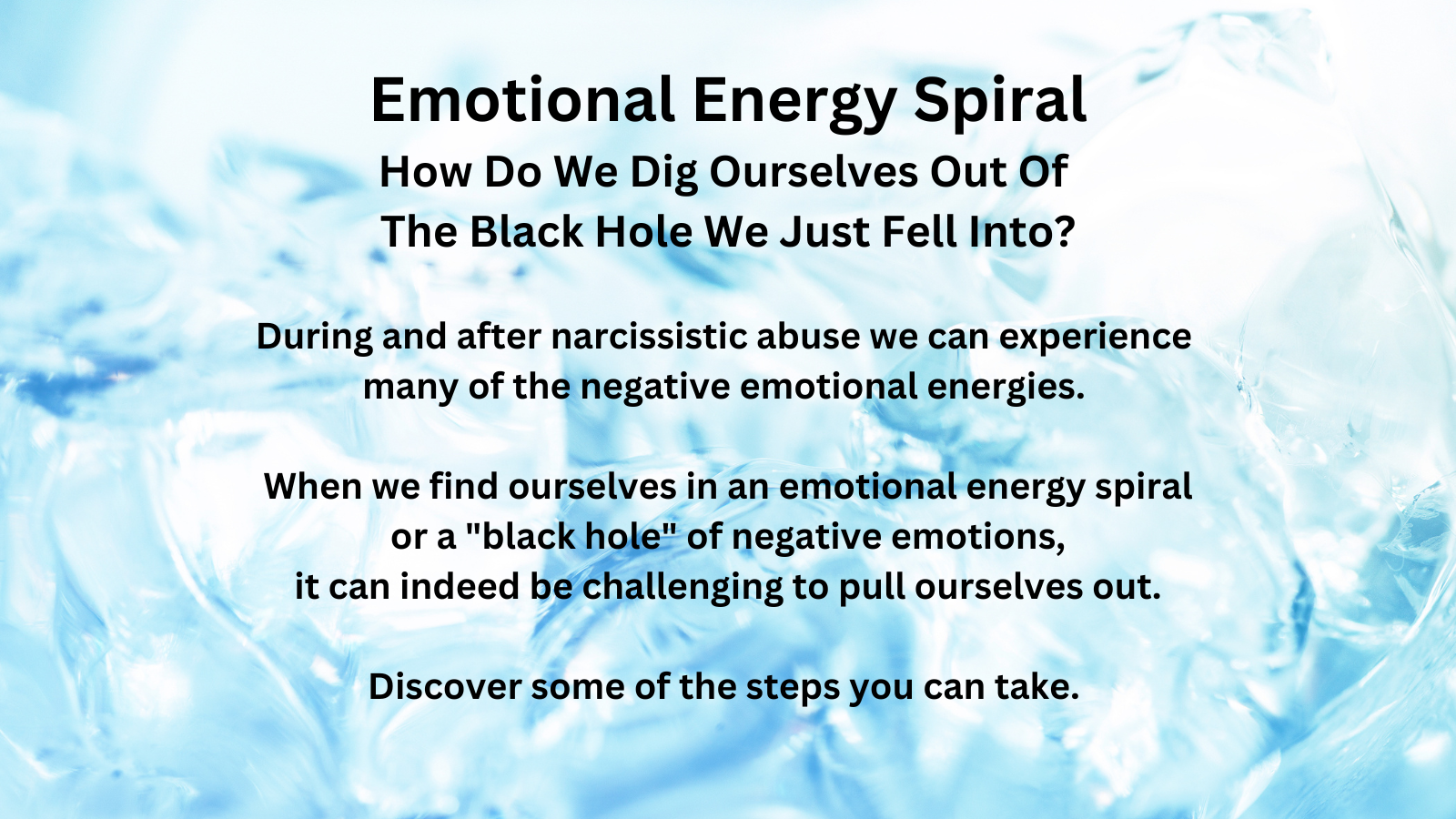How Do We Dig Ourselves Out Of The Black Hole We Just Fell Into?

During and after narcissistic abuse we can experience many of the negative emotional energies.
Guilt, Shame, Fear, Anger, Despair losing the will to live.
Slipping into harmful behaviours.
When we find ourselves in an emotional energy spiral or a “black hole” of negative emotions, it can indeed be challenging to pull ourselves out. However, with patience, self-compassion, and the right strategies, it is possible to gradually dig ourselves out and regain a sense of emotional balance. Here are some steps you can take:
Regain A Sense Of Emotional Balance
- Recognize and acknowledge your emotions: Begin by acknowledging and accepting your feelings without judgment. Understand that it is natural to experience ups and downs in life, and it’s okay to feel overwhelmed or stuck at times.
- Practice self-compassion: Treat yourself with kindness and understanding. Recognize that everyone goes through difficult periods, and you are not alone in this. Be patient and gentle with yourself as you work through your emotions.
- Reach out for support: Don’t hesitate to lean on others for support. Talk to a trusted friend, family member, or therapist about what you’re going through. Sharing your thoughts and emotions can provide relief and gain a different perspective on your situation.
- Engage in self-care: Prioritize self-care activities that help you relax, recharge, and uplift your spirits. This could include exercise, spending time in nature, practising mindfulness or meditation, journaling, listening to music, or engaging in hobbies you enjoy.
- Break the negative thought cycle: Negative thoughts often contribute to the emotional energy spiral. Challenge and reframe negative thinking patterns by consciously focusing on positive aspects of your life, practising gratitude, or using affirmations to shift your mindset.
- Set achievable goals: Break down your tasks and responsibilities into smaller, manageable goals. Accomplishing these smaller goals can help you regain a sense of control and accomplishment, boosting your emotional well-being.
- Seek professional help if needed: If your emotional state persists or worsens, it may be helpful to consult a doctor. They can provide you with additional guidance, support, and interventions tailored to your specific needs.
Remember, digging yourself out of an emotional energy spiral takes time and effort. Be patient with yourself and celebrate small victories along the way. With persistence and self-care, you can gradually regain your emotional balance and move forward towards a more positive and fulfilling state of mind.
What can we do to help ourselves if we are unsupported and isolated from friends and family?
If you find yourself unsupported and isolated from friends and family, it can be more challenging to navigate through an emotional energy spiral. However, there are still steps you can take to help yourself.
Seek online communities: Look for online communities or support groups related to your specific struggles or interests. Engaging with like-minded individuals can provide a sense of connection, understanding, and support, even if it’s in a virtual setting.
Reach out to helplines or hotlines: Many helplines and hotlines offer anonymous support for various emotional challenges. They can provide a listening ear, offer guidance, or connect you with additional resources. Research and reach out to relevant helplines in your area.
Consider therapy or counselling: Look for online therapy or counselling services that offer remote sessions. Many therapists now provide virtual sessions, which can be a valuable resource for individuals who are isolated. Online therapy can provide a confidential space to express your emotions, gain insights, and develop coping strategies.
Educate Yourself
Utilize self-help resources: Explore self-help books, websites, podcasts, or online courses that address the specific issues you’re facing. These resources can offer guidance, techniques, and practical advice to help you navigate through difficult emotions on your own.
Prioritize self-care and self-soothing activities: Engage in activities that promote self-care and self-soothing. This could include practising mindfulness or meditation, engaging in creative pursuits, taking soothing baths, practising deep breathing exercises, or finding solace in nature. Find what works for you and make it a priority.
Focus on personal growth: Use this time of isolation to focus on personal growth and self-improvement. Explore new hobbies or interests, learn new skills through online courses, or engage in activities that bring you a sense of accomplishment and fulfilment.
Practice self-compassion: Be kind to yourself and practice self-compassion. Remind yourself that it’s okay to feel lonely or unsupported at times and that you deserve care and understanding. Treat yourself with the same level of kindness and compassion you would offer a close friend.
While being unsupported and isolated can be difficult, remember that there are resources available to help you navigate through challenging times. Take advantage of online communities, helplines, and remote therapy options. Focus on self-care, personal growth, and self-compassion. With time and persistence, you can still make progress in managing your emotions and finding a way out of the emotional energy spiral.
How do we start to rebuild when we have been left maybe emotionally or financially devastated?
Rebuilding after experiencing emotional or financial devastation due to abuse can be a daunting task, but it is possible to regain control and move forward. Here are some steps to consider:
If you are still in an abusive situation. Ensure your safety.
Make a list of local authorities, helplines, or support organizations that specialise in supporting abuse survivors. Hopefully, they will provide guidance, resources, and assistance in finding a safe environment. Unfortunately, it can be a bit of a postcode lottery as I am sure many of you will affirm. As I know from experiences and the experience of many other women.
Reach out to therapists, grief counsellors, or support groups that specialize in trauma and abuse recovery. If money is an issue and paying for these services is not possible search for online groups that offer free support networks from people who have gone through what you are experiencing. Professionals can provide guidance, the main thing is that you can process your emotions, and develop coping strategies.
Finding a network of compassionate people who can validate your experiences and provide encouragement can be invaluable during the recovery process.
Make Sure You Know Your Legal Rights And The Financial Support Available
Evaluate your financial situation: prioritize your immediate needs, are there assistance programs or non-profit organizations that provide support for abuse survivors in your city or region? Be resourceful, are there items you no longer need that could be sold?
Have you been left with debts that maybe you were coerced into? In the UK economic and financial abuse is starting to be recognised, the organisation Surviving Economic Abuse does not offer direct support, but they have campaigned to get this form of abuse recognised in law. Now financial institutions are becoming more aware and you may be able to get help with reducing or writing off debts that you have been coerced into from an abusive ex-spouse or partner.
Set small, achievable goals. Set some small goals for yourself that will help you to regain your financial stability. Eliminate debts. Grow your income. Secure a job. Start a side hustle.
Celebrate the smallest of achievements. This could be just the fact that you were able to reach out to a support network for advice. I know how difficult the first steps can be as you build your confidence and your motivation.
Take Small Steps To Regain Your Confidence
Gain new skills or enhance existing ones. This can improve your employability and open up new opportunities for financial stability. When my confidence was at ground zero many years ago as a stay-at-home mum. I decided to do some volunteer work. So if you are on some welfare or supported payments find out if you can volunteer in your local area as this can help your confidence and meet new people.
Make self-care a priority during this healing journey. Do activities that bring you joy, relaxation, and emotional well-being. That could be cooking, gardening, or space clearing, the last one can be good for the soul, going through wardrobes, drawers cupboards to throw items away or recycle or sell. Maybe there are photographic reminders of the past that you no longer want to see anymore.
Other things you can do include exercise, meditation, journaling, engaging in hobbies, spending time in nature, or seeking out therapeutic activities like art or music or dancing.
If you have been financially devastated: Consider professional guidance for financial recovery. A professional can assist you in creating a budget, managing debt, rebuilding credit, and making informed financial decisions.
Remember, healing and rebuilding after abuse takes time, and everyone’s journey is unique.
With time, resilience, and the right support, you can rebuild your life and create a brighter future.
Is it as simple as being able to change your thinking and it will change your life?
While changing your thinking can have a profound impact on your life, it is important to recognize that it is not a simple or instantaneous process. Shifting your mindset can be a powerful tool for personal growth and transformation. However, it usually requires time, effort, and consistent practice. Here are some key points to consider:
MINDSET: With a positive and growth-oriented mindset, you can develop resilience and optimism. Gaining a greater sense of control over your life.
CHANGING YOUR THINKING: This involves identifying and challenging negative or unhelpful thoughts and replacing them with more positive and empowering ones. This requires self-awareness, soul-searching, and a willingness to question your beliefs and assumptions.
CONSISTENCY and PRACTICE: Transforming your thinking patterns is not a one-time event but an ongoing practice. It involves reframing negative situations and challenging self-limiting beliefs and “lack” thought patterns, choosing positive thoughts. I used positive affirmations to help me out of a dark place. If you have never practised affirmations just try with two or three affirmations that you can write out and pin up somewhere. Repeat them in the morning and when going to bed.
Here are a couple of affirmations I used back in October 2020.
“I’m still here. I’m still on my feet. I will keep moving until I find the freedom and peace I deserve.”
Daily Wisdom for Why Does He Do That? – Lundy Bancroft
And this affirmation around fear from an online training course, The 8 Spiritual Secrets For Multiplying Your Money.
“I can have fears without my fears having me. I am greater than my fears. I will connect with love, I deserve to have everything I love, and am willing to release my fears and live the life I want to live”
Mary Morrissey
EMOTIONAL AWARENESS: Acknowledging and processing your emotions allows you to understand the underlying thoughts and beliefs that contribute to your experiences.
EXTERNAL FACTORS: There could be external situations that you can not change. Systemic barriers, and environmental limitations, that impact your experiences. Changing your thinking can help you navigate these challenges, but it may not eliminate them entirely.
You may be caught up in conflict and court battles that you do not want and can not get out of. This is when you need to be able to process your emotions. Ensure you are getting enough sleep, eating nutritious food, and engaging in activities you enjoy.
HOLISTIC APPROACH: Try to adopt a holistic approach that includes self-care, healthy relationships, pursuing meaningful goals. Addressing any other areas of your life that require attention. It is through consistent effort and self-reflection. Plus a commitment to personal growth that you can gradually transform your thinking patterns and create positive change in your life.
Where to start?
Guilt – Replace self-blame and self-criticism with self-affirmation and self-acceptance.
Shame – Forgiving yourself and others can be a powerful step towards healing.
Fear – Affirmations and mindfulness meditations. Journaling, creative writing.
Anger – Practice controlled anger release, options include recording yourself in a voice memo talking about the things that make you feel angry. Or take a pillow and give it a good thumping. You might even try screaming out loud but not in earshot of people unless you want the police at your door.
Despair – Seek support. We all need help and support at certain times in our life. Trauma therapy, grief counselling, a support group or even a short retreat that gets you completely away from all the negativity and external factors for a while.
Remember all of this takes time to process and recover and rebuild. Try to be kind to yourself and seek support when needed. Just believe in yourself and you will be okay, you can do this.

As a survivor of post-separation abuse, I know firsthand the struggles of navigating a broken system. My first book shines a light on the laws that fail women. And offers a call to action for much-needed change.


